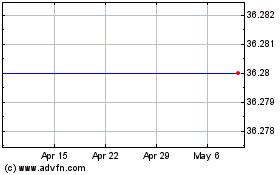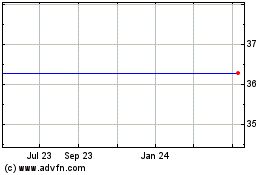Small Cable Firms Go Without AMC's Channels as 'Walking Dead' Returns
February 23 2016 - 1:50PM
Dow Jones News
About 105 small cable TV operators in early January stopped
carrying AMC Networks Inc.'s channels, leaving roughly 350,000
subscribers in smaller rural markets without access to the biggest
drama on cable, "The Walking Dead."
But so far, neither side seems overly concerned.
The operators say they haven't suffered a material increase in
subscriber disconnections. And AMC says it isn't worried about the
drops, which amount to less than 0.5% of its flagship channel's
reach of 93 million households.
The operators that dropped AMC's networks refused to sign on to
a deal the programmer reached in January with the National Cable
Television Cooperative, which negotiates on behalf of hundreds of
smaller U.S. cable operators. AMC says it will roughly double its
carriage fees over the next several years under the terms of that
deal, assuming consumers don't drop pay TV service at a faster
pace.
"We knew that not every one of the 700 members was going to be
able to come in," given the fee increase, said Bob Broussard,
president of distribution at AMC. Still, Mr. Broussard said he
hopes to find a way to work with the holdouts.
The parting of ways reflects the new normal in the
long-contentious relationship between cable providers and
television channels. Small cable operators are putting more
emphasis on their broadband services and many are choosing to walk
away from television carriage deals that are too costly, including
with longtime partners such as AMC and Viacom Inc. At the same
time, media companies, under pressure to show investors growth, are
pushing for big carriage-fee increases with pay TV providers even
as their subscribership, overall, is contracting.
No other metric for U.S. media companies is being watched more
closely by investors than those carriage fees. Fears of
"cord-cutting" and elevated subscriber losses as well as increasing
negotiating leverage for big distributors have dinged media stocks
in recent months. Though the financial impact of this drop for AMC
isn't material, according to Guggenheim Securities analyst Michael
Morris, "investors should take all of these things seriously."
If the smaller operators demonstrate that their customer ranks
didn't diminish significantly as a result of the drops, Mr. Morris
said, it will give bigger distributors "real-world evidence" to
bargain for cheaper carriage rates with AMC. On the flip side, if
the operators do show signs of stress, it would be a "net positive"
for AMC and show the value of its programming, he said.
AMC is getting a 45% increase in carriage fees from NCTC in the
first year of the deal, slightly down from the 50% increase it
would have won had all the operators continued carrying it,
according to people familiar with the matter. Under the new
contract, AMC now makes a little more than $1.25 a month per
subscriber for all its channels.
Though the flagship AMC channel's distribution declined due to
the drops, its smaller sister networks WE tv, IFC, SundanceTV and
BBC America, will add subscribers thanks to new
channel-distribution requirements AMC won as part of the deal.
Several operators that dropped AMC say they aren't
hurting—though some executives acknowledge that "The Walking Dead"
only just returned in mid-February and things may worsen.
Alaska's General Communications Inc. says it has fewer
subscriber disconnections so far this year compared with a year
earlier, when it carried AMC. Arkansas-based WEHCO Video Inc. and
USA Communications in the Midwest said they hadn't suffered an
uptick in subscriber losses without AMC. "It's been significantly
less than what we had anticipated," said Charlotte Dial, vice
president of administration at WEHCO.
AMC's Mr. Broussard says "it's not going to happen on day one
but over time they could really feel the impact."
Some operators who dropped AMC's channels say that the fee
increase under the NCTC deal doesn't line up with the fact that a
few popular shows make up the majority of its channels' viewership
among their subscribers. Moreover, they say, current and past
seasons of those programs are available online through
pay-per-download services like Vudu and subscription services like
Netflix.
Jim Holanda, chief executive of Grande Communications in Texas,
which did sign on to the NCTC deal, said it was "very fair and
middle of the road," but acknowledged the calculus for small
providers has changed.
"Every renewal, a drop is on the table for us," he said. "I
think that is a new reality."
Write to Shalini Ramachandran at
shalini.ramachandran@wsj.com
(END) Dow Jones Newswires
February 23, 2016 13:35 ET (18:35 GMT)
Copyright (c) 2016 Dow Jones & Company, Inc.
Gci Liberty, Inc. (delisted) (NASDAQ:GNCMA)
Historical Stock Chart
From Jun 2024 to Jul 2024

Gci Liberty, Inc. (delisted) (NASDAQ:GNCMA)
Historical Stock Chart
From Jul 2023 to Jul 2024
